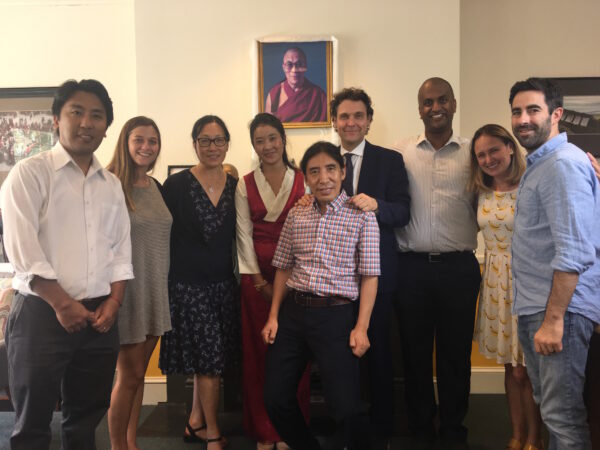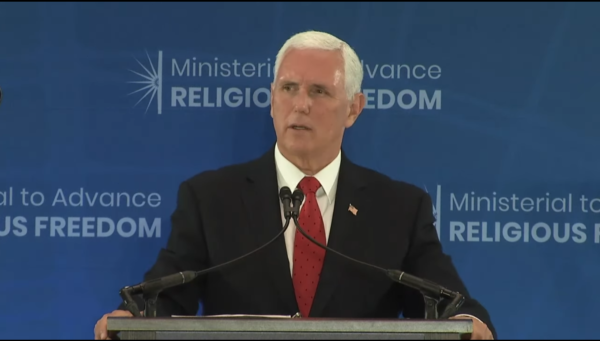During the second Ministerial to Advance Religious Freedom held July 16 to 18, 2019, the Tibetan issue received attention at the highest level of American leadership.
While Vice President Pence and House Speaker Nancy Pelosi (D-Calif.) focused on the plight of the Tibetan people in their remarks at the ministerial, President Trump heard directly from a Tibetan about the need for US support for the Dalai Lama.
Nyima Lhamo, who fled Tibet to tell the world about Chinese injustice in her homeland, delivered her message to Trump in the White House on the afternoon of July 17.
Meeting the president in the Oval Office alongside other survivors of religious persecution participating in the ministerial, Nyima Lhamo spoke up spontaneously to ask for US support for the Tibetan people.
“I’m from Tibet. It’s my dream to visit, this opportunity to visit the president [of] America,” Nyima Lhamo said, adding “Tibetan need America’s support, please. We need support.”
Nyima Lhamo asked for US support for the Dalai Lama to return to Tibet. Trump replied by thanking her and asking her to “say hello,” presumably to the Dalai Lama.
Visit to ICT

A day after meeting President Trump in the White House, Nyima Lhamo visited the International Campaign for Tibet on July 18, 2019
Nyima Lhamo also delivered strong and emotional testimony at the ministerial on the morning of July 17, calling for China to be held accountable for the death of her uncle, the Tibetan lama Tenzin Delek Rinpoche, whom she believes was killed by Chinese authorities in prison.
The next day, Nyima Lhamo visited the offices of the International Campaign for Tibet (ICT), where she discussed her impromptu conversation with the president.
Nyima Lhamo said she hadn’t expected to meet Trump, but once she did, she felt it was very important for her as a Tibetan to share her desire for the Dalai Lama to return home. So even though she was nervous and uncomfortable with English, she decided to speak up.
She added that she believes Tibetan inside Tibet will hear of the meeting and that she hopes the US will continue to promote religious freedom.
Pence, Pelosi and others speak up for Tibetan Buddhists

Vice President Mike Pence called out China’s decades-long oppression of Tibetan Buddhists during his address at the Ministerial to Advance Religious Freedom on July 18, 2019
Vice President Pence, who addressed the ministerial on July 18, referred to the plight of Tibetan Buddhists in his remarks.
Highlighting China’s interference in the Tibetan reincarnation system, Pence referred to the “legitimate Panchen Lama,” who was recognized by the Dalai Lama in 1995 and has not been seen in public since.
Pence said, “China’s oppression of Tibetan Buddhists goes back decades. As part of its efforts to oppress Tibetan Buddhism, back in 1995, Chinese authorities captured the legitimate Panchen Lama, then just a 6-year-old boy, and neither he nor his family have been heard from in the 24 years since.”
Pence also addressed the US’ ongoing trade conflict with China, saying “Whatever comes of our negotiations with Beijing, you can be assured the American people will stand in solidarity with the people of all faiths in the People’s Republic of China, and we will pray for the day that they can live out their faith freely without fear of persecution.”
On July 16, Speaker Pelosi and retired Republican Congressman Frank Wolf of Virginia participated in a discussion on religious freedom challenges in China. The discussion was moderated by Ambassador-at-Large for International Religious Freedom Sam Brownback.
Pelosi and Wolf referred to the bipartisan support for religious freedom of the Tibetan people. Pelosi added that unless the international community actively challenges China over its treatment of Tibetans and others undergoing persecution, it will lack credibility when raising issues in other parts of the world.
At the end of the ministerial, several statements were issued by the State Department, including one on China that says, “Tibetan Buddhists and all other faith communities should be able to select, educate, and venerate their religious leaders without government interference.”

